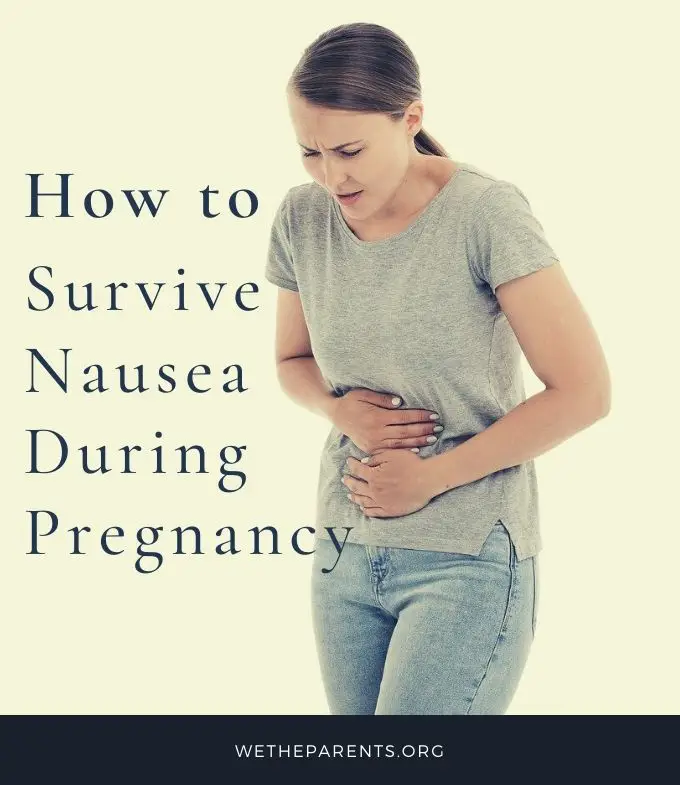If you’re experiencing nausea and vomiting during pregnancy, you’re not alone. An estimated 70 – 80% of women experience this during pregnancy.
For many new moms-to-be, morning sickness is triggered by distinct odors and flavors. For others, there is no rhyme or reason for their discomfort.
We’ve consulted several experienced moms and clinicians to bring you a comprehensive list of tips and tricks on how to cope with morning sickness. After all, we want to ensure that you and your baby have the best possible nourishment.
In this article:
When does nausea during pregnancy start?
Many women experience nausea as early as six weeks after implantation. This is because of an increased amount of human chorionic gonadotropin (hCG) in a woman’s system at this time.1Is nausea during pregnancy a good sign?
mayoclinic.org/healthy-lifestyle/pregnancy-week-by-week/expert-answers/nausea-during-pregnancy/faq-20057917
Nausea symptoms usually continue for six to nine weeks. As the name implies, morning sickness symptoms tend to be heightened during the a.m. hours. Still, there are plenty of women who experience stomach sickness during morning, noon, or night.
What are the symptoms of morning sickness?
Morning sickness is nausea and vomiting in pregnancy. These discomforts can also be accompanied by fatigue, dehydration, dizziness, and disorientation.
Expectant mothers should see a doctor if they suspect their symptoms result from something other than a healthy pregnancy.
What causes nausea during pregnancy?
Doctors are not 100% sure what causes morning sickness. However, most are confident that pregnancy nausea is related to the body’s release of hormones, particularly human chorionic gonadotropin (hCG).
After all, most women experience nausea and vomiting during the first trimester, when their hCG levels are highest.
While nausea and vomiting are not the most enjoyable ways to kick off the most magical nine months of your life, they’re a good sign that your baby and, in particular, your placenta, are starting to take shape.
When does morning sickness end?
For many women, morning sickness starts to subside around week ten. By week twelve, the placenta is completely formed and takes over hormone production.
Nausea complications
Unfortunately, severe nausea and vomiting can cause several health problems, including:
Dehydration
When you lose more fluids than you take in, you experience dehydration. When dehydration continues, pregnant women must be given intravenous fluids.
Signs of dehydration include:
- Thirst
- Tiredness
- Headaches
- Dizziness/confusion
- Constipation
- Dry mouth or chapped lips
- Increased/decreased heart rate
- Dark yellow urine
- Decreased frequency of urination
Dehydration can be harmful to both you and your baby. As such, you should seek medical help if experiencing any of the above symptoms. Pregnancy complications caused by dehydration vary from one trimester to the next.
During the first trimester, dehydration can cause overheating, headaches, and urinary tract infections (UTIs). During the first months of pregnancy, dehydration can also directly impact the amount of amniotic fluid in your womb.2Umber, A. (2010).
Intravenous versus oral maternal hydration therapy for increasing amniotic fluid volume. Annals of King Edward Medical University, 16(1), 14-14.
Low amniotic fluid, which is sometimes called oligohydramnios, is linked to several congenital and genetic conditions, including umbilical cord compression, joint tightness, and poor lung development.3Umber, A. (2010). Intravenous versus oral maternal hydration therapy for increasing amniotic fluid volume. Annals of King Edward Medical University, 16(1), 14-14.
During the second trimester, low amniotic fluid has the biggest impact on a baby’s lung development. In extreme cases, developmental issues could lead to infant loss.
During the final trimester, dehydration can cause early contractions and, in extreme cases, even premature birth.
Increased perspiration
You may notice that you’re sweating more now that your hormone levels, blood flow, and body temperature have increased.
If sweating excessively, it’s important to make sure you’re not suffering from hyperemesis or severe morning sickness.
This condition impacts an extremely small number of expectant mothers. However, those that do suffer from hyperemesis are more likely to experience dehydration and other setbacks.
Frequent urination
Morning sickness is often accompanied by increased urination. The same hormones that most likely cause morning sickness, hCG, and progesterone, influence this increase in urination.
Worn tooth enamel
When stomach acid comes in contact with tooth enamel, it can lead to premature erosion. Women who vomit almost every morning are more likely to experience dental issues during pregnancy.
In addition to stomach acid, some nauseous pregnant women experience dry mouth and dehydration, which can also cause tooth decay. Those experiencing gingivitis, or gum disease, during pregnancy are more likely to give birth before full-term.
Pregnant women should still see their dentist regularly to keep their gums healthy while keeping in mind that dental procedures can trigger additional nausea.
Severe morning sickness
In rare cases, severe nausea and vomiting during pregnancy are caused by hyperemesis gravidarum (HG).4Lee, N. M., & Saha, S. (2011). Nausea and vomiting of pregnancy. Gastroenterology Clinics, 40(2), 309-334.
Symptoms of hyperemesis gravidarum include severe nausea, vomiting, weight loss, and dehydration. Women are at a greater risk of developing hyperemesis gravidarum if they have one of the following conditions:
- Overweight/Obese
- First pregnancy
- A multiple pregnancy
- Trophoblastic disease
- A previous case of hyperemesis gravidarum
When left untreated, HG can cause several maternal and fetal complications. Babies born to mothers with hyperemesis gravidarum sometimes suffer advanced and even life-threatening neurological and gastrointestinal issues.5What Are The Complications Of Hyperemesis Gravidarum (HG)?
hyperemesis.org/about-hyperemesis-gravidarum/complications/
Get in touch with your medical provider if vomiting three or more times a day, or if you’ve lost more than five pounds since becoming pregnant.
Some women experience such debilitating cases of hyperemesis gravidarum that they become unable to care for themselves, or even work.
Subsequent malnutrition and dehydration may harm expectant mothers and their unborn babies. As such, it is vital that those with extreme symptoms seek out early medical intervention.
Is morning sickness relief possible?
You should talk with your doctor before considering any over-the-counter nausea remedies. They should be able to advise you which treatments can help quash your queasiness.
In extreme cases, prescription medication may be necessary. However, there are plenty of simple preventive measures you can take to eliminate pregnancy-related discomforts.
Take your prenatal vitamins
Your prenatal vitamins will provide you with your daily dose of essential nutrients, even if you can’t keep all of your food down.
Some women experience stomach problems even when taking multivitamins. To avoid added discomfort, avoid taking your vitamins on an empty stomach.
What’s more, wait till that early morning queasiness passes before popping any pills.
Alter what you eat
Try to avoid ‘trigger’ foods. Pregnancy is known to alter a woman’s taste and appetite. It should be easy for you to identify and steer clear of the foods and beverages that you now find intolerable.
You might also avoid hot foods, which tend to be more flavorful and aromatic.
Furthermore, keep plenty of bland, carb-rich foods on hand. Crackers, dry cereals, toast, and pretzels are just a few of the foods that will help you make it through your first trimesters without going hungry.
Alter when you eat
Reduce nausea episodes by breaking your eating schedule into smaller, more approachable meals. Try eating or drinking at separate times. Do your best to avoid an empty stomach, which can churn up excessive amounts of stomach acid.
Bland, cold foods, and beverages are also known to help nauseous pregnant women. After all, they’re less likely to produce strong odors and can be generally soothing.
A study published in the “Primary Care Update for OB/GYNS” showed that 95.5% of doctors recommended their pregnant patients to eat frequent small meals to avoid nausea.
Meanwhile, 88.5% of doctors recommended that their pregnant patients with morning sickness snack on soda crackers.6Power, M. L., Holzman, G. B., & Schulkin, J. (2001).A survey on the management of nausea and vomiting in pregnancy by obstetrician/gynecologists. Primary Care Update for Ob/Gyns, 8(2),69-72.
Stay hydrated
Regular vomiting can lead to dehydration. Try to drink eight to ten 12-ounce cups of water each day. Healthy fluid intake is good for pregnancy and health in general.
Dehydration can exacerbate the symptoms of morning sickness. If struggling to keep your liquids down, consider adding some fresh herbs, honey, or fruit.
Take it easy
If you’re experiencing morning sickness, do your best to get up slowly and pace yourself throughout the day. Nausea often keeps pregnant mothers from physical activity, but studies show that moderate exercise can reduce the impact of morning sickness.7Downs, D. S., Chasan-Taber, L., Evenson, K. R., Leiferman, J., & Yeo, S. (2012).
Physical activity and pregnancy: past and present evidence and future recommendations. Research quarterly for exercise and sport, 83(4), 485-502.
Moderate activity or exercise, such as walking, low-impact yoga, water aerobics, or mild stretching, may help you release endorphins, granting you some relief from your pregnancy symptoms.
Over-the-counter medicines
Always talk to your health provider before taking over-the-counter morning sickness medications. They may recommend that you take B6 supplements, ginger, or even doxylamine for your nausea.
Consult a doctor
If your symptoms are severe enough, your doctor may offer you a prescription for an antiemetic, which is an anti-nausea and vomiting drug.
Common morning sickness drugs include antihistamines, vitamin B-6, and dopamine antagonists. Doctors may also prescribe metoclopramide in some extreme cases.8Harrington, R. A., Hamilton, C. W., Brogden, R. N., Linkewich, J. A., Romankiewicz, J. A., & Heel, R. C. (1983). Metoclopramide. Drugs, 25(5), 451-494.
Give ginger a try
Herbs, including ginger, have been known to lessen the complications of pregnancy nausea.9Firouzbakht, M., Nikpour, M., Jamali, B., & Omidvar, S. (2014).Comparison of ginger with vitamin B6 in relieving nausea and vomiting during pregnancy. Ayu, 35(3), 289.
According to a study in Volume 8 of the “Primary Care Update for OB/GYN,” over 50% of doctors recommend ginger to pregnant patients experiencing sickness in the morning.10Power, M. L., Holzman, G. B., & Schulkin, J. (2001).A survey on the management of nausea and vomiting in pregnancy by obstetrician/gynecologists. Primary Care Update for Ob/Gyns, 8(2), 69-72.
Of course, not all women appreciate the pungent aroma of this herbal root.
Vitamin B6
Studies show that vitamin B6 relieves many of the symptoms of nausea for pregnant women.11Firouzbakht, M., Nikpour, M., Jamali, B., & Omidvar, S. (2014).Comparison of ginger with vitamin B6 in relieving nausea and vomiting during pregnancy. Ayu, 35(3), 289.
Prenatal vitamins have about 2mg of vitamin B6. According to researchers at the University of Michigan’s School of Medicine, pregnant women should take 10 to 25mg of vitamin B6 three times per day throughout pregnancy.12Vitamin B6 for Morning Sickness
uofmhealth.org/health-library/tn9126
With this in mind, excessive intake of vitamin B6 can cause permanent nerve damage in unborn babies. For this reason, expectant mothers should be aware of the dangers of excessive B6 intake.
Doxylamine
Taking one tablet of doxylamine at night can promote sleep. Not only will you experience enhanced sleep, but doxylamine can improve morning sickness.
Holistic alternatives
While there is limited research to back up its benefits, many moms swear that acupressure offered them significant relief from morning sickness.
A review of 42 acupressure studies showed that direct stimulation of pressure points may eliminate nausea and vomiting in pregnant patients.13Lee, E. J., & Frazier, S. K. (2011). Lee, E. J., & Frazier, S. K. (2011).Lee, E. J., & Frazier, S. K. (2011). The efficacy of acupressure for symptom management: a systematic review. Journal of pain and symptom management, 42(4), 589-603.
Many moms experience success with an acupressure wrist band that relieves morning sickness by applying pressure on each wrist with a plastic stud.
Studies also show that targeted acupuncture may be a helpful clinical treatment for nausea and hyperemesis gravidarum.14Acupuncture “Clinically Useful” for Morning Sickness
acupuncturetoday.com/mpacms/at/article.php?id=27775
Aromatherapy may also help reduce your chances of nausea and vomiting during pregnancy. In a 2014 study, researchers found that when pregnant women inhaled essential lemon oil, the frequency and severity of their morning sickness were reduced.15Safajou, F., Shahnazi, M., & Nazemiyeh, H.The effect of lemon inhalation aromatherapy on nausea and vomiting of pregnancy: a double-blinded, randomized, controlled clinical trial. Iranian Red Crescent Medical Journal, 16(3). (2014).
Ginger, peppermint, lavender, and chamomile oils are also known to relieve pregnancy nausea.
While research is limited, some experts recommend hypnosis as a treatment for pregnant women with unresolved hyperemesis gravidarum. Hypnosis may be used to induce a deep state of psychological relaxation.16Simon, E. P. (1999).Hypnosis in the treatment of hyperemesis gravidarum.. American family physician, 60(1), 56.
With that said, only trained hypnosis practitioners should ever attempt this sort of treatment.
Frequently asked questions
How is hyperemesis gravidarum diagnosed?
Your doctor will consider your morning sickness symptoms when analyzing your urine and blood samples for signs of dehydration, ketosis, electrolyte abnormalities, and weight loss.17Abell, T. L., & Riely, C. A. (1992).Hyperemesis gravidarum. Gastroenterology Clinics of North America, 21(4),835-849.
Is morning sickness worse when you’re having a girl?
Believe it or not, there is a direct (but not concrete) link between severe morning sickness and fetal sex. Studies show that severe cases of hyperemesis gravidarum are more likely to be linked to pregnancies with female babies.18Chan, R. L., Olshan, A. F., Savitz, D. A., Herring, A. H., Daniels, J. L., Peterson, H. B., & Martin, S. L. (2011). Maternal influences on nausea and vomiting in early pregnancy.
Maternal and child health journal, 15(1), 122-127.
Can morning sickness be harmful to an unborn baby?
While morning sickness is a sign of a healthy and productive pregnancy, it can also cause potential complications to expectant moms and their unborn babies. For this reason, you should be proactive about your nausea. Whenever you have concerns, consult your medical provider.
Should I be concerned if my morning sickness stops abruptly?
Morning sickness can change, worsen, or disappear without warning. Any sudden changes are indicative of a problem.
Your placenta may have taken over the production of your pregnancy hormones, or you might be doing something to lessen your overall symptoms.
If concerned, don’t hesitate to reach out to your doctor or midwife. They can perform tests to rule out other health issues and, when necessary, prescribe medicines that can lessen the impact of your morning sickness.
Can I take reflux medications for my nausea?
Antacids are safe for pregnancy and may be used to reduce symptoms of gastroesophageal reflux disease (GERD).19Abell, T. L., & Riely, C. A. (1992).Hyperemesis gravidarum. Gastroenterology Clinics of North America, 21(4), 835-849.
Calcium carbonate antacids, such as Tums and Rolaids, can also help reduce your acid reflux, offering you some relief from your nausea. However, be careful of taking large amounts of antacids for a long period of time, as it may be linked to hypocalcemia.20Robertson JR, W. C. (2002).Calcium carbonate consumption during pregnancy: an unusual cause of neonatal hypocalcemia. Journal of child neurology, 17(11), 853-855.
Does morning sickness only occur at night?
Only 2% of expectant mothers experience nausea and vomiting in the morning. Don’t be surprised if you experience morning sickness in the middle of the day or even late at night.
Wrapping up
Morning sickness isn’t fun, but our comprehensive guide to nausea should help you eliminate some of that early pregnancy queasiness and crack on with a healthy pregnancy. Let us know what tricks work best for you!





